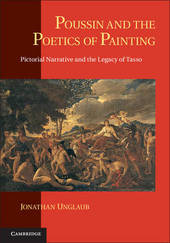
|
Poussin and the Poetics of Painting: Pictorial Narrative and the Legacy of Tasso
Paperback / softback
Main Details
| Title |
Poussin and the Poetics of Painting: Pictorial Narrative and the Legacy of Tasso
|
| Authors and Contributors |
By (author) Jonathan Unglaub
|
| Physical Properties |
| Format:Paperback / softback | | Pages:305 | | Dimensions(mm): Height 254,Width 178 |
|
| Category/Genre | Art History
Painting and paintings |
|---|
| ISBN/Barcode |
9781107626744
|
| Classifications | Dewey:759.4 |
|---|
| Audience | | Professional & Vocational | |
|---|
|
Publishing Details |
| Publisher |
Cambridge University Press
|
| Imprint |
Cambridge University Press
|
| Publication Date |
8 September 2014 |
| Publication Country |
United Kingdom
|
Description
This examines how Poussin cultivated a poetics of painting from the literary culture of his own time, and especially through his response to the work of Torquato Tasso. Tasso's poetic discourses were the most important source for Poussin's theory of painting. The poet's ideas on artistic imitation, novelty, and plot structure and unity, which are exemplified in his epic La Gerusalemme liberata, proved to be fundamental to the artist's conception of narrative painting, culminating in the Israelites Gathering Manna. In the paintings after the Gerusalemme, Poussin does not merely illustrate Tasso's verse, but cultivates pictorial means to refashion the poet's metaphors of desire. The interplay of poetic and painterly imagery also animates Poussin's Ovidian masterpieces, the Echo and Narcissus and the Realm of Flora. Offering interpretations of these works, this book also investigates Poussin's larger literary culture and how this context illuminates the artist's response to contemporary poetic texts.
Author Biography
Jonathan Unglaub is Assistant Professor of Fine Arts at Brandeis University, Massachusetts. A scholar of Renaissance and Baroque art, he has contributed to The Art Bulletin and The Burlington Magazine, and has received fellowships from the Fulbright Commission, the Andrew W. Mellon Foundation (at the Metropolitan Museum of Art), the Getty Humanities Center, and the Clark Institute.
Reviews'Jonathan Unglaub weighs in in this book with his own substantial offering on the 'links between Poussin's art and literary culture'.' Quaderni d'italianistica 'Unglaub's book is a welcome addition.' Renaissance Quarterly
|